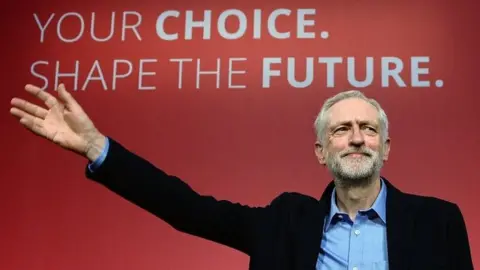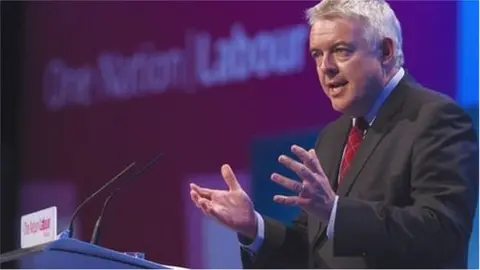Welsh Labour leadership election rules unchanged
 PA
PAWelsh Labour will not change its leadership election rules to the system which saw Jeremy Corbyn chosen as leader, its ruling body has decided.
It turned down a proposal to move to a one member one vote system, which gives ordinary members' votes more weight.
On Saturday, the party's Welsh Executive Committee (WEC) decided to retain an electoral college system.
This means members' votes are weighed equally with those of trade unions, affiliated groups, MPs, MEPs and AMs.
First Minister Carwyn Jones said he was pleased the WEC had decided to "retain the system that has worked so well for Welsh Labour".
But pro-Corbyn Labour AM Mike Hedges said he was "surprised and disappointed".
 PA
PAWelsh Labour held a consultation on changing its leadership rules after it was given the power at a UK party conference last year.
It offered the party the chance to follow UK Labour's move to a one member one vote (OMOV) system - where "registered supporters" are also given a vote.
The system was seen as helping Mr Corbyn win the leadership.
But the option for change in Wales was rejected.
Mr Jones said of the decision: "Welsh Labour is at its best and its boldest when it harnesses the support, ideas and enthusiasm of all those who share our values and ideals."
He added the electoral college, where the votes of three groups are weighed equally, "helped us do just that, bringing together as it does all those with a stake in our party and our country".
OMOV had been seen as a way to increase the chances a more left-wing candidate could take the reins after Mr Jones, by adding weight to the votes of ordinary members attracted to the party under Mr Corbyn since 2015.

But Labour AM Mick Antoniw, a Corbyn supporter, said it was "a mistake to believe the thousands of new members are all ones who will vote a particular way or follow a particular instruction to vote".
Welcoming the decision to keep the electoral college, he said: "We have never been a single-member organisation.
"Our structure has always reflected our relationship with the organised trade union movement. For me that's of fundamental importance.
"Within Wales we have a much closer, much stronger relationship with our trade unions."
Swansea East AM Mike Hedges, an advocate of OMOV, said: "I'm surprised that they've gone outside the way that different parties throughout the rest of Britain have gone for electing leaders.
"Everybody else has moved away from electoral college," he said.
"Electoral college means that you can get two-thirds of the vote of individual members. You can even get two-thirds of the vote of trade unionists, and still lose."
The rules will also apply to the future deputy leadership election. The WEC also decided AMs, MPs and council leaders would be eligible to stand for the post.

 Thinkstock
ThinkstockAnalysis: Nick Servini, BBC Wales Political Editor
Welsh Labour insists it is sticking with an electoral college that has served it well over the years, but it goes against the grain by resisting a one member one vote system which has helped secure Jeremy Corbyn's grip on the Labour party.
And it means a candidate from the left of the party will now be far less likely to succeed Carwyn Jones when he decides to step down as first minister and leader of Welsh Labour.
It is also worth pointing out a candidate will also need to be nominated by a fifth of Labour AMs in order to stand in the first place.
During a consultation leading up to the decision, there were more in favour of one member one vote but there was overwhelming support for sticking with the status quo among the senior party figures who make up the party's Welsh Executive Committee.
Much has been made of the internal Labour power-struggle in recent years with the Corbynista wing taking control. But in Wales, at least that only appears to have gone so far.
